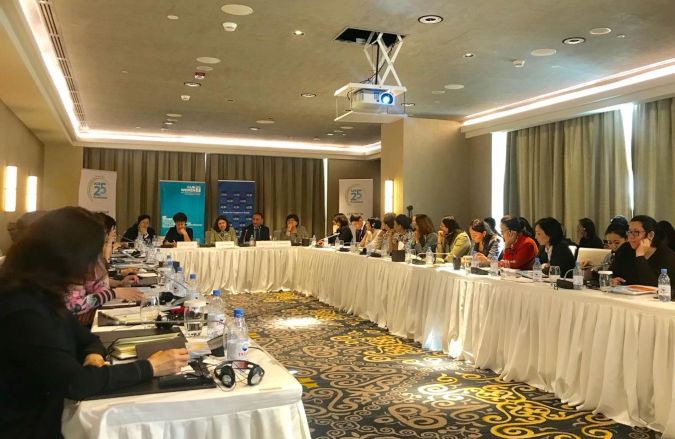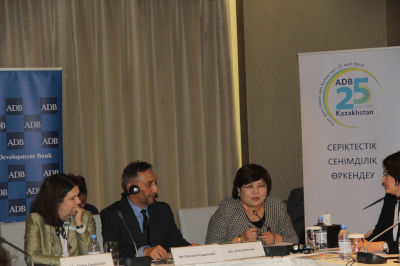Women’s Economic Empowerment in Kazakhstan: Practices, Challenges and Opportunities
Date:

On 27 March, UN Women in Kazakhstan and Asian Development Bank in Kazakhstan organized a round table entitled “Women’s Economic Empowerment in Kazakhstan: Practices, Challenges and Opportunities”. The event was aimed at analyzing and discussing women’s economic empowerment trends in Kazakhstan, with a focus on women’s entrepreneurship.
Two thematic sessions of the round table discussed the recent trends and challenges of women’s representation in the economy, support of the micro-finance organizations to women’s entrepreneurship, and the role of government institutions, civil society organizations and private sector in promoting women’s economic empowerment and entrepreneurship in Kazakhstan.
The event was opened by UN Women Representative, Elaine Conkievich; the Country Director for the Asian Development Bank (ADB), Giovanni Capannelli; and the Deputy Chairperson of the National Commission on Women, Family and Demographic Policy, Elena Tarassenko.
In her opening remarks, Conkievich noted the progress that Kazakhstan has made but also highlighted the need to enhance efforts for women’s economic empowerment in the country. “When women are economically empowered, they can be significant contributors to the economic growth of the country, which has the end effect of contributing to the prosperity of every woman, every man, every girl and every boy in Kazakhstan. A goal that I am sure we can all agree upon,” said Elaine Conkievich. She noted that as Kazakhstan strives to become a member of the OECD and one of the 30 most developed countries in the world, the following actions are relevant in the context of Kazakhstan – promotion of family-friendly policies and working conditions which reduce the unequal burden on women related to family responsibilities, facilitation of women’s participation more in private and public sector employment, promotion of all appropriate measures to end sexual harassment in the workplace, reduction of the gender gap in entrepreneurship activity, and financial literacy with a special focus on the special needs of women from disadvantaged and minority groups.
The participants of the event also discussed the main results of the Country Gender Assessment, recently completed by ADB. According to the report[1], presented by Ketevan Chkheidze, Regional Gender Consultant of ADB, Kazakhstan maintained a steady women’s labour force participation, but the gap between male and female labour is still not showing signs of narrowing.

In 2017, women’s labour force participation rate was at 63.8 per cent compared to 76.2 per cent for men[2]. Women mostly work in sectors defined as the service sphere (71.4 per cent women employed in this sector), and are underrepresented in executive positions in most spheres of economy with the only exception being sphere of education (63.8 per cent of executives are women)[3].
The wage gap between women and men (67.8 per cent), varying significantly by sector of employment, is still a sign of persisting gender inequality despite the high rate of women’s labour force participation[4].
The ADB assessment concludes that to empower women, the country needs to break down educational and occupational stereotypes, promote women’s career advancement to decision-making positions, and reduce wage gaps[5].
The event gathered about 50 persons, including both Deputy Chairpersons and Head of Secretariat of the National Commission of Women, Family and Demographic Policy under the President of the Republic of Kazakhstan, representatives of the Ministry of Labour and Social Protection, Ministry of National Economy, Ministry of Foreign Affairs, Committee on Statistics, Economic Research Institute, women businesses, women’s associations and civil society organisations, development partners and private companies, Damu Entrepreneurship Development Fund, KMF microfinance organization, Association of Business Women of Kazakhstan, and private banks.
[1] https://www.adb.org/sites/default/files/institutional-document/479136/kazakhstan-country-gender-assessment.pdf
[2] Women and men of Kazakhstan 2013-2017.
[3] https://www.adb.org/sites/default/files/institutional-document/479136/kazakhstan-country-gender-assessment.pdf
[4] Women and men of Kazakhstan 2013-2017
[5] https://www.adb.org/sites/default/files/institutional-document/479136/kazakhstan-country-gender-assessment.pdf